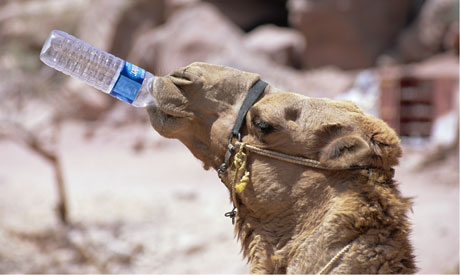Let's go back to basics – historically and conceptually. The cornerstone of security for all civilisations before the Industrial Age was land and water: without secure tenure of the land underpinning the lives of one's citizens, any ruler's tenure was short-lived. Without water, farming and productive enterprise was impossible. Armies were conscripted either to protect one's own land and water, or to take possession of somebody else's.
It wasn't all that different through the Age of Empires, up to the conclusion of the Second World War. It was still about territory, resources, and lebensraum, as well as geopolitical influence. It's only in the last few decades that military security has become somewhat decoupled from this, and geared more to conflicts such as the Cold War, and the ongoing 'Wars' on 'terror' and drugs.
Now there are all sorts of signals that security concerns are beginning to focus once more on land and water – most tellingly in the growing furore about food security, and the so-called 'land grabs' going on around the world.
It's been nearly a decade since the CIA first drew people's attention to China's enthusiasm for acquiring land (by direct purchase or long-lease agreement) in Africa and other countries. Since then, many more countries (especially from the Middle East) have joined the party – explicitly to help meet their own food needs. According to the Food and Agriculture Organisation, nearly 20 million hectares of farmland – almost half the size of all the arable land in Europe – were sold or had been negotiated for sale or lease in 2010.
Ever since the publication of the controversial Limits to Growth in 1972, it's been de rigueur for conventional economists to dismiss people's concerns about food and water security as 'neo-Malthusian scare-mongering'. Just look at the record, they say: year-on-year increases in agricultural productivity; new land brought into production; astonishing innovation in plant breeding and agronomics; increased competitiveness in global supply chains; considerable improvements in water efficiency in both agriculture and industry…
But for how much longer will those factors obtain? Improvements in yields have slowed and even plateaued in some parts of the world. Most of the 'new land' available is in fact degraded or marginal acreage taken out of production because of earlier mismanagement. And all the incremental efficiency gains in the world will not offset the growth of human numbers from 7 billion this year to 9 billion by 2050. As more people switch to Western style, meat-intensive diets, so pressure on land builds inextricably.
China's view of this is simple: food security means controlling access to land and water. It knows it hasn't got enough of its own, and remains uncomfortable having to rely on the food it needs on globally-traded markets. Land-grabbing in other countries is the obvious answer.
And then there's water security. One of the more startling reports that I've read recently is The Blue Peace, from the Strategic Foresight Group. It focuses on the Middle East, a region where the population is going to double to around 600 million people by 2050, and where many countries already face very severe water shortages. Take Yemen. Of the country's 21 main aquifers, 19 are no longer being replenished, and the capital city of Sana'a could run out of water within six years. Yemen imports more than 80% of the food it needs, and there is already evidence that all this is combining to drive violent conflict.
Yemen is not alone. When wheat prices soared back in 2008, costing the region an additional $30 billion in imports, food riots erupted. Many see a connection between the recent 'Arab Spring' uprisings and the region's vulnerability to such price shocks.
That vulnerability can only get worse as food prices spike again, and as the impact of accelerating climate change becomes more and more painful. Lester Brown, President of the Earth Policy Institute, has been pointing this out to world leaders for many years:
"This is not merely a story about the booming demand for food. Everything from falling water tables to eroding soils…means that the world's food supply is unlikely to keep up with our collectively growing appetites. Take climate change: the rule of thumb among crop ecologists is that for every one degree Celsius rise in temperature above the growing season optimum, farmers can expect a 10% decline in grain yields. This relationship was borne out all too dramatically during the 2010 heat wave in Russia, which reduced the country's grain harvest by nearly 40%."
The same food-water-climate nexus emerges across the globe. Altogether, more than half of the world's people live in countries where water tables are falling. And that hasn't escaped the attention of military planners and security experts.
Meanwhile, all that over-excited rhetoric about 'the peace dividend' that followed the end of the Cold War has pretty much evaporated; expenditure on arms reached an astonishing $1.62 trillion in 2010. A significant percentage of that is related (directly or indirectly) to the Middle East.
We still don't join these things up. Poverty fuels violence, and defence spending has a tendency to rise during times of economic hardship, further undermining the real foundations of security. The UN's entire budget (of around $30 billion a year) represents less than 2% of the world's military expenditure. All of which prompts a simple conclusion: sustainability will remain a pipe dream until world leaders' understanding of security is utterly transformed.

